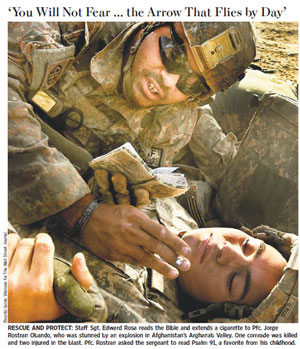Religious Liberty May Be Threatened for U.S. Military
Andrew T. Walker /
Recent events involving perceived restrictions on religious liberty within the Army, Air Force, and the Pentagon have many concerned about the military’s stance toward people of faith. These concerns have even prompted Members of Congress to send a letter to Secretary of Defense Chuck Hagel, seeking answers and clarifications around such circumstances.
In early April, an Army official, in a slideshow presentation to an Army Reserve group in Pennsylvania, compared evangelical Christians and Catholics to “extremists” in the same vein of the terrorist group al-Qaeda.
Army spokesman George Wright said this was an “isolated incident not condoned by the Dept. of the Army,” according to news sources.
“This slide was not produced by the Army and certainly does not reflect our policy or doctrine,” Wright said. “It was produced by an individual without anyone in the chain of command’s knowledge or permission.”
In early May, news outlets reported that military officials at the Pentagon met with activist Mikey Weinstein, who heads the Military Religious Freedom Foundation. Weinstein is notorious for his inflammatory remarks about Christians. The Washington Post reports that the meeting was held to discuss Weinstein’s concerns about proselytizing in the military.
Weinstein met on April 23 with officials to discuss an August 2012 document titled “Air Force Culture, Air Force Standards,” which discussed government neutrality on religion, free exercise, and religious accommodation, according to Fox News.
Many have expressed concerns over an individual such as Weinstein getting an audience with high-ranking military officials on the subject of religious liberty, which he aggressively seeks to curb through offensive characterization. Ron Crews of the Chaplain Alliance for Religious Liberty told Fox News:
Why senior leaders in the Air Force would be meeting with someone to talk about religious liberty, whose sole purpose it appears is to squash religious liberty; that’s a question we have for Air Force officials.
Bigger concerns came after the Weinstein meeting when news reports alleged soldiers could potentially face a court martial for sharing their faith.
In response to such charges, the Pentagon released a statement downplaying the allegations. The statement from Pentagon spokesman Navy Lieutenant Commander Nate Christensen read:
Service members can share their faith (evangelize), but must not force unwanted, intrusive attempts to convert others of any faith or no faith to one’s beliefs (proselytization).
Still, many express concern over what they believe to be an arbitrary distinction between “proselytizing” and “evangelism.”
“What does the military define as proselytization and evangelization?” asked Ron Crews. “We need to know that, because the vast majority of chaplains come from evangelical backgrounds and part of their mission is to share their faith. A great number of our military forces come from evangelical homes where part of their mandate is to share their faith. We need to know what the military means when they use these terms.”
Southern Baptists’ Ethics and Religious Liberty Commission (ERLC) and North American Mission Board (NAMB) issued a joint letter of concern over what they see as “potential threats to religious liberty.”
According to the ERLC and NAMB:
What incidents have taken place, we wonder, that would call for this seemingly arbitrary distinction between “evangelizing” and “proselytizing”? Proselytizing, after all, includes a range of meaning, encompassing a definition of “seeking to recruit to a cause or to a belief.” With a subjective interpretation and adjudication of such cases, we need reassurance that such would not restrict the free exercise of religion for our chaplains and military personnel.
After all, who defines what is proselytizing and what is evangelism? What could seem to be a friendly conversation about spiritual matters to one serviceperson could be perceived or deliberately mischaracterized as “proselytizing” to the person on the receiving end. The fact that this has been raised at all in such a subjective fashion could have a chilling effect on service personnel sharing their faith at all.
These recent actions lack sensitivity to the sincerely held beliefs of military members.
Moving forward, Pentagon officials should repudiate the over-the-top rhetoric of Weinstein and reconsider the merits of meeting with such a virulent opponent of religious expression, especially on issues related to religious tolerance.
While the Pentagon has thankfully denied that evangelism is against military code, military officials should carefully communicate and delineate how “evangelism” and “proselytizing” are to be distinguished. They should also reaffirm respect for people of faith and their freedom of expression, rather than allowing a climate of intimidation against religious liberty to prevail.

